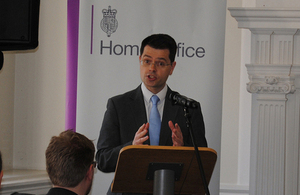Immigration Minister James Brokenshire announces 'Right to Rent' will apply to whole of England from 1 February 2016
Immigration Minister James Brokenshire has today announced that the Immigration Act 2014's 'Right to Rent' checks will be introduced across the whole of England from next February.
The new law means that landlords and their agents have a duty to check the immigration status of potential tenants or lodgers before entering into a residential tenancy agreement. Failure to do so could lead to a penalty of up to £3,000 per tenant.
 Immigration Minister James Brokenshire said today: "Right to rent checks are quick and simple, and many responsible landlords already do them as a matter of routine. We are providing landlords in England with all the advice and support they need before the checks go live on 1 February 2016."
Immigration Minister James Brokenshire said today: "Right to rent checks are quick and simple, and many responsible landlords already do them as a matter of routine. We are providing landlords in England with all the advice and support they need before the checks go live on 1 February 2016."
"The new rules are part of the Immigration Act 2014 which introduced measures to reform the immigration system. Right to rent is about deterring those who are illegally resident from remaining in the UK. Those with a legitimate right to be here will be able to prove this easily and will not be adversely affected."
"The government's new Immigration Bill builds on the reforms in last year's Act, making it harder for people to live and work in the UK illegally. The Bill proposes new measures to make it easier for landlords to evict illegal tenants as well as a new criminal offence targeted at unscrupulous landlords who repeatedly fail to carry out right to rent checks."
The Government also today published the results of its evaluation into the impact of 'Right to Rent' checks following the initial pilot of the scheme in the West Midlands area.
The main evaluation report (82-pages) is here, while a 'mystery shopper' report to test the potential for discrimination within the private rental sector is available here. A separate research report with landlords, letting agents and tenants can be read here.
A short GOV.UK summary page on 'Right to rent checks: what they mean for you' can be read here.
According to Free Movement, the Government's evaluation did find that a higher proportion of Black and Minority Ethnic (BME) 'mystery shoppers' were asked to provide documents during rental enquiries and that comments from some landlords during focus groups did indicate a potential for discrimination.
Free Movement also raised concerns over the "worryingly tiny" sample size used for the research.
However, Free Movement says that the evaluation found overall that final outcomes were neutral and "there were no major differences in tenants’ access to accommodation between phase one and the comparator area".
As we reported last month, the Joint Council for the Welfare of Immigrants (JCWI) warned in its own evaluation report that the scheme has a number of negative impacts on tenants and landlords.
JCWI's Saira Grant said: "The findings from our independent evaluation show that the Right to Rent policy encourages discrimination and has created a hostile environment for all migrants and ethnic minorities in the UK seeking to access the private rental market. Our evaluation shows direct discrimination by landlords against those legally here but with complicated or unclear immigration status. These checks are leading to increased racial profiling. Those who appear foreign or have foreign accents are finding it increasingly difficult to access tenancies."
Labour's shadow Home Secretary Andy Burnham has also warned recently that the scheme risks becoming the modern equivalent of infamous "no dogs, no blacks, no Irish" signs.
"Right to Rent in its current form could lead to widespread discrimination. Of course, we have come a long way as a society since landlords displayed unwelcoming notices in their windows. But the new document checks could become the modern equivalent of the 'no dogs, no blacks, no Irish' signs and, by being more insidious, such casual discrimination will be far harder to challenge," Burnham said.